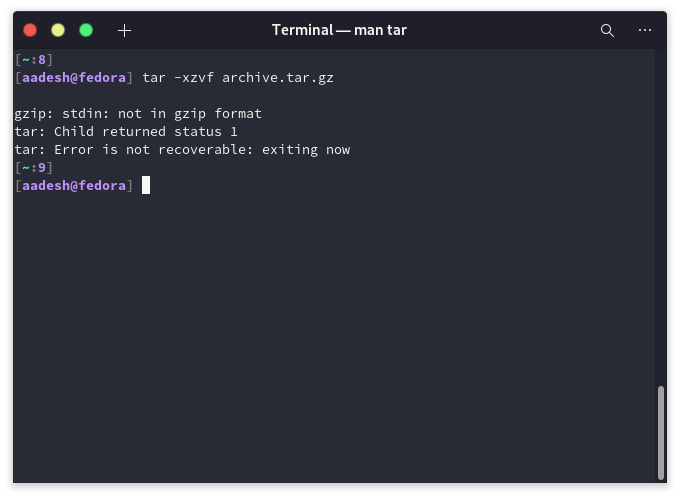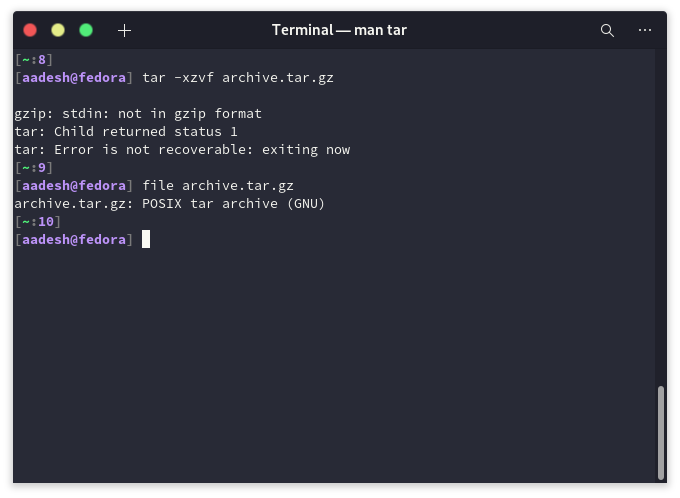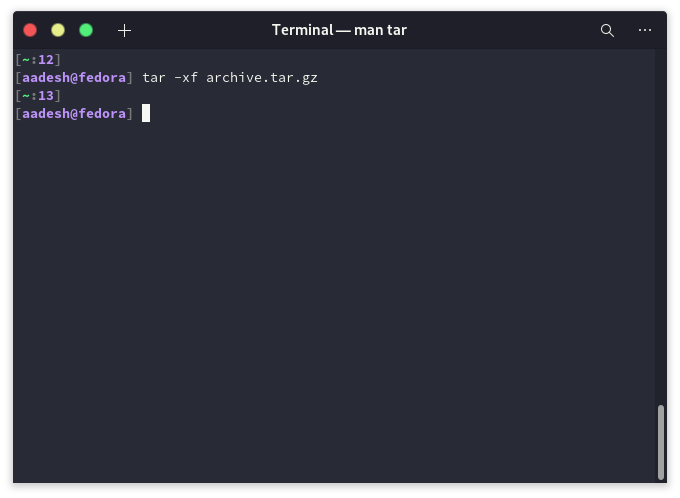Проблема
я попытался разархивировать файл MyFile.tar.gz, который по имени был похож на сжатый файл.
Но во время распаковки я обнаружил ошибку «gzip stdin not in gzip format», которая была следующей:
$ tar xvzf MyFile.tar.gz gzip: stdin: not in gzip format tar: Child returned status 1 tar: Error exit delayed from previous errors
Ошибка указывает, что файл не в формате gZipped.
Тогда в каком формате этот файл?
Чтобы выяснить это, я запустил команду «file»:
file MyFile.tar.gz MyFile.tar.gz: POSIX tar archive (GNU)
Причина: причина ошибки вполне очевидна.
Файл не является сжатым файлом, а файлом архива POSIX.
Это означает, что он вообще не был заархивирован, но вместо этого был сжат с помощью tar.
Я думаю, что потом его просто переименовали.
Решение: поскольку это был не сжатый файл, простой tar может извлечь файл:
tar xvf MyFile.tar.gz
This means the file isn’t really a gzipped tar file — or any kind of gzipped file — in spite of being named like one.
When you download a file with wget, check for indications like Length: unspecified [text/html] which shows it is plain text (text) and that it is intended to be interpreted as html. Check the wget output below —
wget --no-cookies --no-check-certificate --header "Cookie: gpw_e24=http%3A%2F%2Fwww.oracle.com%2F; oraclelicense=accept-securebackup-cookie" "http://download.oracle.com/otn-pub/java/jdk/8u144-b01/090f390dda5b47b9b721c7dfaa008135/jdk-8u144-linux-x64.tar.gz"
--2017-10-12 12:39:40-- http://download.oracle.com/otn-pub/java/jdk/8u144-b01/090f390dda5b47b9b721c7dfaa008135/jdk-8u144-linux-x64.tar.gz
Resolving download.oracle.com (download.oracle.com)... 23.72.136.27, 23.72.136.67
Connecting to download.oracle.com (download.oracle.com)|23.72.136.27|:80... connected.
HTTP request sent, awaiting response... 302 Not Allowed
Location: http://XXXX/FAQs/URLFiltering/ProxyWarning.html [following]
--2017-10-12 12:39:40-- http://XXXX/FAQs/URLFiltering/ProxyWarning.html
Resolving XXXX (XXXXX)... XXX.XX.XX.XXX
Connecting to XXXX (XXXX)|XXX.XX.XX.XXX|:80... connected.
HTTP request sent, awaiting response... 200 OK
Length: 17121 (17K) [text/html]
Saving to: ‘jdk-8u144-linux-x64.tar.gz’
100%[=========================================================================================================================================================================>] 17,121 --.-K/s in 0.05s
2017-10-12 12:39:40 (349 KB/s) - ‘jdk-8u144-linux-x64.tar.gz’ saved [17121/17121]
This sort of confirms that you haven’t received a gzip file.
For a correct file, the wget output will show something like Length: 185515842 (177M) [application/x-gzip] as shown in the below output —
wget --no-cookies --no-check-certificate --header "Cookie: gpw_e24=http%3A%2F%2Fwww.oracle.com%2F; oraclelicense=accept-securebackup-cookie" "http://download.oracle.com/otn-pub/java/jdk/8u144-b01/090f390dda5b47b9b721c7dfaa008135/jdk-8u144-linux-x64.tar.gz"
--2017-10-12 12:50:06-- http://download.oracle.com/otn-pub/java/jdk/8u144-b01/090f390dda5b47b9b721c7dfaa008135/jdk-8u144-linux-x64.tar.gz
Resolving download.oracle.com (download.oracle.com)... XX.XXX.XX.XX, XX.XX.XXX.XX
Connecting to download.oracle.com (download.oracle.com)|XX.XX.XXX.XX|:80... connected.
HTTP request sent, awaiting response... 302 Moved Temporarily
Location: https://edelivery.oracle.com/otn-pub/java/jdk/8u144-b01/090f390dda5b47b9b721c7dfaa008135/jdk-8u144-linux-x64.tar.gz [following]
--2017-10-12 12:50:06-- https://edelivery.oracle.com/otn-pub/java/jdk/8u144-b01/090f390dda5b47b9b721c7dfaa008135/jdk-8u144-linux-x64.tar.gz
Resolving edelivery.oracle.com (edelivery.oracle.com)... XXX.XX.XXX.XX, 2600:1404:16:188::2d3e, 2600:1404:16:180::2d3e
Connecting to edelivery.oracle.com (edelivery.oracle.com)|XXX.XX.XX.XXX|:443... connected.
HTTP request sent, awaiting response... 302 Moved Temporarily
Location: http://download.oracle.com/otn-pub/java/jdk/8u144-b01/090f390dda5b47b9b721c7dfaa008135/jdk-8u144-linux-x64.tar.gz?AuthParam=1507827127_f44251ebbb44c6e61e7f202677f94afd [following]
--2017-10-12 12:50:07-- http://download.oracle.com/otn-pub/java/jdk/8u144-b01/090f390dda5b47b9b721c7dfaa008135/jdk-8u144-linux-x64.tar.gz?AuthParam=1507827127_f44251ebbb44c6e61
Connecting to download.oracle.com (download.oracle.com)|XX.XX.XXX.XX|:80... connected.
HTTP request sent, awaiting response... 200 OK
Length: 185515842 (177M) [application/x-gzip]
Saving to: ‘jdk-8u144-linux-x64.tar.gz’
100%[=========================================================================================================================================================================>] 185,515,842 6.60MB/s in 28s
2017-10-12 12:50:34 (6.43 MB/s) - ‘jdk-8u144-linux-x64.tar.gz’ saved [185515842/185515842]
The above shows a correct gzip application file has been downloaded.
You can also file, head, less, view utilities to check the file. For example, an HTML file would give the below output —
head jdk-8u144-linux-x64.tar.gz
Output:
<!doctype html>
<html lang="en">
<head>
<meta charset="utf-8">
<meta http-equiv="X-UA-Compatible" content="IE=edge">
<meta name="viewport" content="width=device-width, initial-scale=1">
<link href="/css/print.css" rel="stylesheet" media="print">
<link href="/css/main.css" rel="stylesheet" media="screen">
<link href="/css/font-awesome.min.css" rel="stylesheet">
The above shows it is indeed an HTML page which we are trying to unzip/untar — something that won’t work. If it was indeed a correct zip file (binary in nature) the output of head would have produced garbage — something like below —
head jdk-8u144-linux-x64.tar.gz
Output:
x�rY�[ms�F������ڍtіl���DR���Ŋ��j
$�$,`0�h�_����/��=�@Q�w+��ձ*�Hbfz�{�~�{�i�x��k����}����z���w����g�����{��;{s����w����7�N����i�
�����}
�¿g��������ק���7��s�����폺î߹�����~i��j�/�����#���=��=>��߿{}��|�������������3���X���]9�ޠ����u�����%ğ�<^)�H�8�F�R�t�o�L�u��S%�ds5�2_EZn�t^��
�N3��(��<��|'�q���R�N�gq�Uv!�ۻ�p���rL��M��u��.�Q�5�T��BNw�!$��<>�7G'$�,Mt4WY�Gi"�=��p�)�VIN3����ek��0��G
�<L�c�ē�t-���2���G:Ϣia��I�<ʋg3���d�H����[2`�<I�A�6�W��<��C�������h��A0QL�2�4�-*
�x���Е�t%t1��f�>+A͂�,Lr�
�Fe:MBH��ɩ�
C�Q�r�S��<M�b�<,5���@���s��݉c��sp�f�=g��?��k���4�}��kh)�¹Z��#d�*{���-�.N�)�e��s:�H(VQ��3*�$2��rϨv�"o�_��!A�������B�l=A�|��@��0��1��5��4g�
�
���Se����H[2�����t��5�Df����$1���b$� h�Op����!Lvb!p��b�8^�Y���n�
O��Ԫ߱��|��lW�lu��*�N�M���
�/�^0~�~�#��q��������K��;�d���aw4����ݎ'�~�7��ky�o���������t�'k��f����!vo���'o��� �.�Pn�
�+��K"FA{����n2����v��!/Ok��r4�c5�x$'�.�&w�!�%�ޠo������2���i
�a0��Ag�d����GH)G7~�g���b��%�b��rt�m~� �����t0�� <������������5�q�t��K(��+Z<��=���:1��x�p=t�`��G@F�� i�����p8�����H.���dMLE��e[�`�'n��*h[��;�0w'��6A�١M�x�fpeB>&���MO�������`�@á/�"�����(��^���n��=����5��@�Mx��d:YAn���]|�w>��S��FA9�J�k!�@�
Try downloading from the official site and check if their download links have changed. Also check your proxy settings and make sure you have the right proxies enabled to download/wget it from the correct source.
Hey folks! In this article, we will discuss how to solve gzip: stdin: not in gzip format error while extracting a zipped file using the tar command.
Let’s say you’re trying to extract an archive named archive.tar.gz using the tar command.
It throws the following error:

What Could Be the Reason?
First, check the type of the file using the file command, run :

The output says that the given file is a POSIX tar archive, which means the file was not zipped in a tar.gz format, it was only compressed using the tar command and was later renamed for some reason.
The problem arises when you try to extract the compressed file, using a zip (-z) option of the tar command.
Difference between Tar, Zip and Gz
There are a few differences between a tar, a zip, and a gz archive format. Files ending with .tar extension are uncompressed archive files, whereas files ending with .zip extensions are usually compressed zipped files. And a .gz file can or cannot be an archive, but it is a compressed file as well.
Solution for the gzip: stdin: not in gzip format error
We just have to not use -z attribute in our tar command to begin the extraction of the archive. Type the following commands in your terminal and run :
Now, your file will be extracted correctly, as this time we do not encounter any error on our screen.

Conclusion
Because naming conventions do not matter in Linux, one can get easily confused if someone decides to rename a video file in .txt format. It will still play, mind you, but it will be confusing to a lot of new users. Similarly, if someone renames a .tar file to .tar.gz extension, it will cause problems as well. Use file command followed by the name of the file to know the format of any file if you encounter any issue while executing it. We hope you solved your encountered problem with the help of this article.
Diagnosing a Downloaded File of the Wrong Type
As steeldriver says, this means the file isn’t really a gzipped tar file — or any kind of gzipped file — in spite of being named like one.
When you download a file with wget, there are often indications that you’ve ended up getting a different kind of file than what you were looking for:
ek@Io:~$ wget http://openwall.com/john/f/john-1.7.0.2.tar.gz
--2017-01-28 23:57:33-- http://openwall.com/john/f/john-1.7.0.2.tar.gz
Resolving openwall.com (openwall.com)... 195.42.179.197
Connecting to openwall.com (openwall.com)|195.42.179.197|:80... connected.
HTTP request sent, awaiting response... 301 Moved Permanently
Location: http://www.openwall.com/john/ [following]
--2017-01-28 23:57:40-- http://www.openwall.com/john/
Resolving www.openwall.com (www.openwall.com)... 195.42.179.202
Connecting to www.openwall.com (www.openwall.com)|195.42.179.202|:80... connected.
HTTP request sent, awaiting response... 200 OK
Length: unspecified [text/html]
Saving to: ‘john-1.7.0.2.tar.gz’
john-1.7.0.2.tar.gz [ <=> ] 15.27K 3.61KB/s in 4.2s
2017-01-28 23:57:51 (3.61 KB/s) - ‘john-1.7.0.2.tar.gz’ saved [15633]
In this case, the main signs are:
- The
301 Moved Permanentlymessage, redirecting to an address with a trailing/. This loads the default page for some directory on the server, which is usuallyindex.htmland almost always an HTML file. Length: unspecified [text/html], telling you that you’re receiving plain text (text) and that it is intended to be interpreted ashtml. This is really more than a sign — you can be pretty sure you haven’t gotten a real gzipped file based on this.
You can also use the file utility, which examines a file and tells you what kind of file it looks to be:
ek@Io:~$ file john-1.7.0.2.tar.gz
john-1.7.0.2.tar.gz: HTML document, ASCII text, with very long lines
And of course you can examine the file yourself, with tools such as head, less, and view:
ek@Io:~$ head john-1.7.0.2.tar.gz
<!DOCTYPE html PUBLIC "-//W3C//DTD HTML 4.01 Transitional//EN" "http://www.w3.org/TR/html4/loose.dtd">
<HTML>
<HEAD>
<TITLE>John the Ripper password cracker</TITLE>
<link href="/style.css" type="text/css" rel="stylesheet">
<META name="keywords" content="John the Ripper, password cracker, JtR, password checker, password recovery, password, cracker, crackers, cracking, crack, crypt, passwd, shadow, Unix, Linux, Windows, Win32, Mac OS X, Mac OSX, MacOS X, OS X, OSX, DOS, VMS, OpenVMS, hash, DES, MD5, Blowfish, Kerberos, AFS, LM, LanMan, LanManager, NT, 2000, XP, 2003, Vista, 7, NTLM, NTLMv1, MD4, Netscape LDAP, SHA, SSHA, MySQL, TGT, s/key, Eggdrop, Apache, apr1, SYSUAF, SYSUAF.DAT, AltiVec, MMX, SSE, SSE2, AVX, XOP, wordlist, wordlists, dictionary, brute force, decrypt, challenge, response, John, Ripper, john, jhon, jonh, jack, Jack the Ripper">
<META name="description" content="A fast password cracker for Unix, Windows, DOS, and OpenVMS, with support for Unix, Windows, and Kerberos AFS passwords, plus a lot more with contributed patches">
</HEAD>
<BODY bgcolor="#E0E0E0" text="black" link="blue" alink="red" vlink="navy">
If this were really a binary file, then you would’ve gotten a whole bunch of meaningless garbage instead, as whatever pager or viewer your use fruitlessly attempts to interpret something as plain text that really isn’t. For example, on the correct file:
ek@Io:~$ head john-1.8.0.tar.gz
WӦQ♥john-1.8.0.tar ▒▒kw▒ر&▒▒ٿ▒▒▒▒4E]|▒v▒NF▒d[▒n▒▒▒L&▒HB▒$▒ ▒df͚▒▒▒▒▒ꩪ▒7@▒▒▒9ӳf▒▒J▒m ▒ؗ▒u▒▒~,▒ї▒▒▒ˣ▒▒ӣ_▒▒▒▒C▒▒|▒▒▒▒▒şw▒v▒▒>▒|w▒▒▒}▒▒▒ί▒▒i9▒?7+▒gY7i▒$▒▒ʲ▒▒s?▒J'MV%▒rY4ur[▒4▒▒e▒▒.▒▒▒▒▒&/u▒-2▒W▒▒V▒▒!o▒0b▒▒▒♥▒|Q▒4▒▒▒&▒▒Y1Y▒F▒▒Iy▒▒▒▒$▒▒▒▒,▒]▒h▒▒8▒"▒▒M▒,Һ~(▒i▒4Y▒d▒QgQ▒*ۚf7yA▒.▒&i▒<d▒↓▒7▒H_-l▒7▒▒▒Z▒▒.m▒▒ʒ%F,▒۬▒*▒▒hrW▒cY▒▒
▒+▒O1▒-y>▒▒J▒yM?▒4I▒▒▒kYS▒▒:▒▒n▒C▒▒%▒▒▒v▒▒▒{[[tN▒9▒▒▒kA▒▒▒▒▒/[▒▒▒▒u▒▒▒z▒▒▒▒>▒▒5▒▒▒▒t▒t▒▒Y6Û<▒*/i▒i{K>▒,▒▒▒▒▒;9)▒Z.mJSeiLB▒▒▒▒▒j▒▒eQ緅▒_▒α▒Ŋ▒▒▒W▒▒▒▒▒_▒▒ˢ▒▒-q▒<gyw͍▒9▒?▒,▒▒▒▒h&▒V"▒▒▒▒▒▒▒l▒▒3▒▒▒▒▒▒i#▒▒综▒◄0▒▒▒.e♠>a▒▒▒▒▒▒$klt:▒▒rA▒M▒'F▒R▒▒▒▒Lo▒♥1z▒▒↓X▒▒▒P"֕▒▒▒♦▒▒▒▒|▒▒▒▒▒▒1I▒o"'#|6e▒▒t▒Ц▒FVL▒▒S▒ޓ▒▒;▒x▒▒▒▒▒▒▒QVrr▒▒▒9O▒W7▒♠Og▒
▒▒▒8▒▒/▒▒dm▒FG'▒'t2L▒▒&L▒Y:▒▒▒▒▒4▒rI<▒#▒+▒je▒▒▒>T9▒▒M▒XE-ʆ▒▒'n▒▒$↑▒m▒W▒▒w̕▒▒m▒n%▒|A_▒yGp↑D▒↓▒▒▒i▒▒}ӡH▒▒▒▒$$H▒▒&▒▒4▒▒▒Z-@♣▒*~▒▒▒ y6▒▒▒`▒v↓▒s▒+̱▒?▒1▒▒▒<▒>▒^▒▒Y#k▒
7`N'▒o▒.&▒▒(▒Դ~AD▒"E◄' lq▒`▒▒`▒[▒9◄▒▒wzuK▒N▒▒Y▒▒%or▒▒)▒▒i↓▒▒▒l5.S▒r▒_*▒RO▒{▒$▒(▒▒▒▒C▒·▒▒׀f2ˊ[:▒▒▒,|ew▒▒▒Ag▒'▒▒▒H▒▒t▒{͓▒▒▒▒JH˭s▒)g▒ON▒▒eŚQ▒▒▒♠ s▒▒ߪ▒▒▒▒▒▒▒▒▒▒_♠▒-▒
(I’ve only copied the very beginning of that.)
Getting the Right File
That tells you how to figure out what went wrong in these situations (and in this case, in particular). But how do you actually find and download the correct file?
This varies from situation to situation. However, a good start is to:
-
Go to the official website for the software and see if they provide download links. Even if that’s how you got the link you’re using originally, if some time has passed you may find that the link has changed.
For example, in this particular case, the current version is 1.8.0 instead of 1.7.0.2 (and provided in the
jsubdirectory instead off), and the old version is no longer available at that same URL. -
Go to the page that you were redirected to when you downloaded the file. In this case, that’s: http://www.openwall.com/john/
Or you can even examine the file that was downloaded. (Or open it in a web browser.)
You got redirected to the software’s main download page. You can either download in a web browser, or copy a correct current download link and download it with wget. There are a few choices, but assuming you don’t actually need that specific old version you were trying to download, and based on the specific file you did attempt to download, I suspect http://openwall.com/john/j/john-1.8.0.tar.gz is what you are looking for.
Of course, readers who find this post later may find that link no longer works. But the approach demonstrated here for troubleshooting this sort of problem will remain valid.
ek@Io:~$ wget http://openwall.com/john/j/john-1.8.0.tar.gz
--2017-01-29 00:16:19-- http://openwall.com/john/j/john-1.8.0.tar.gz
Resolving openwall.com (openwall.com)... 195.42.179.197
Connecting to openwall.com (openwall.com)|195.42.179.197|:80... connected.
HTTP request sent, awaiting response... 200 OK
Length: 5450412 (5.2M) [application/x-tar]
Saving to: ‘john-1.8.0.tar.gz’
john-1.8.0.tar.gz 100%[================================================================================>] 5.20M 78.8KB/s in 26s
2017-01-29 00:16:47 (202 KB/s) - ‘john-1.8.0.tar.gz’ saved [5450412/5450412]
I’ve downloaded the file. Notice that, this time, no undesired redirection happened and the type is given as application/x-tar instead of text/html.
(An HTTP redirection is not always bad. It’s when you get redirected to something that doesn’t seem like it could really be the file you’re looking for that you should suspect your download has not really succeeded.)
file agrees:
ek@Io:~$ file john-1.8.0.tar.gz
john-1.8.0.tar.gz: gzip compressed data, was "john-1.8.0.tar", last modified: Thu May 30 04:19:35 2013, max compression, from Unix
And it unpacks successfully:
ek@Io:~$ tar xf john-1.8.0.tar.gz
ek@Io:~$ cd john-1.8.0/
ek@Io:~/john-1.8.0$ ls -l
total 12
drwxrwxr-x 2 ek ek 4096 Jan 29 00:22 doc
lrwxrwxrwx 1 ek ek 10 May 29 2013 README -> doc/README
drwxrwxr-x 2 ek ek 4096 Jan 29 00:22 run
drwxrwxr-x 2 ek ek 4096 Jan 29 00:22 src
(You are right that it doesn’t matter if you use the z; it would still have worked with tar xzf, since this is the correct file.)
You can proceed to build the source code and install.
Remember, You Don’t Always Have to Build From Source
Sometimes you really want the latest version of a program, and it’s not in Ubuntu’s repositories. You might try to find a PPA, but if you don’t find any you really trust or that provide quite what you want, or you want to build it with custom options, or you just really like building from source code, then building from source code is a valuable and useful technique.
I do recommend checking at least the software that is available in Ubuntu’s official repositories for your system, though. On my 16.04 system:
ek@Io:~$ apt show john
Package: john
Version: 1.8.0-2
Priority: optional
Section: admin
Origin: Ubuntu
Maintainer: Ubuntu Developers <ubuntu-devel-discuss@lists.ubuntu.com>
Original-Maintainer: Ruben Molina <rmolina@udea.edu.co>
Bugs: https://bugs.launchpad.net/ubuntu/+filebug
Installed-Size: 452 kB
Depends: libc6 (>= 2.14), john-data (= 1.8.0-2)
Suggests: wordlist
Homepage: http://www.openwall.com/john/
Supported: 5y
Download-Size: 184 kB
APT-Sources: http://us.archive.ubuntu.com/ubuntu xenial/main amd64 Packages
Description: active password cracking tool
John the Ripper is a tool designed to help systems administrators to
find weak (easy to guess or crack through brute force) passwords, and
even automatically mail users warning them about it, if it is desired.
.
Besides several crypt(3) password hash types most commonly found on
various Unix flavors, supported out of the box are Kerberos AFS and
Windows NT/2000/XP/2003 LM hashes, plus several more with contributed
patches.
There are several other ways to search for packages. Often it’s handy to use the Ubuntu Packages Search web page.
Since you were going to attempt to install version 1.7.0.2, presumably version 1.8.0 in the official repositories is recent enough. (Indeed, 1.8.0 seems to be the same version as the one provided for download from the official website.) So you really might just want to install that:
sudo apt update
sudo apt install john
In this article, we will discuss the solution for the error gzip: stdin: not in gzip format and what is the reason behind this error.
What Could Be the Reason for the error?
This error generally occurs when the user has created a simple tar file using the options(-cvpf), where
- c: create a new archive
- v: verbose
- p: extract information about file permissions (default superuser)
- f: use archive file
but at the time of extraction, a user tries to extract the file as a gzip file type using the options (-xzpf), where
- x: extract the file from the archive
- z: zgip file type
- p: extract information about file permissions (default superuser)
- f: use archive file
Difference between Tar, Zip, and Gz
| Basis | Tar | Zip | Gz |
|---|---|---|---|
| Definition | Tar is a utility which was designed to combine the multiple files into single file. | Zip is a utility that came in MS-DOS which is used for file compression. | Gz is a file extension that is used with gzip archive file. |
| Space efficiency | It takes highest number of memory space. | It takes sometime highest or moderate number of memory space. | It takes least number of memory space. |
| Operating System supported | Unix and Linux operating system | Unix, Linux, Windows, Macintosh, Minix, Atari, Amiga, VMS, MS-DOS etc. | Unix and Linux operating system. |
Solution for the gzip: stdin: not in gzip format error
1. To solve the error, first, we need to check the file type.
file demo.tar.gz
2. As it is clearly shown this is not a gzip archive file but it is a POSIX archive file.
3. So, we got the almost solution to the problem. hence we need to extract the POSIX archive file using (-xvpf) options.
tar -xvpf demo.tar.gz
Conclusion
On the above article, it describes about an error when users uses different tar command options for creation and extraction. So, for solving this query first we need to look after the file type of the archive file. The ‘file’ command in Linux comes in handy and then we can use multiple of tar command options to solve this problem.
Last Updated :
30 Jan, 2023
Like Article
Save Article



